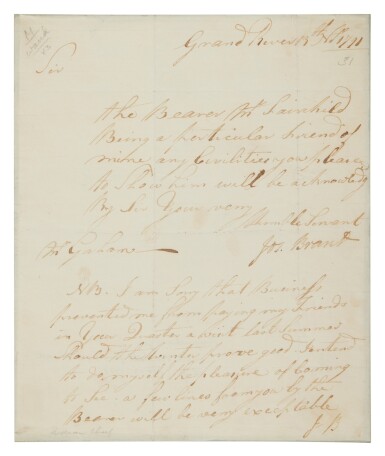4 pp. incomplete lacking one or more pages. 13x8½”. Possibly to Joel Poinsett, the first US envoy to newly independent Mexico. This letter was written just before Porter resigned from the U. S. Navy to become Commander in Chief of the new Mexican Navy. Although incomplete, the final sentence of the fourth page speaks of being about to leave Mexico City to inspect his future fleet, the missing page may have included little more than the salutation and signature. Porter was a hero of the war against the Barbary Pirates, during which he was taken prisoner and jailed, and in the War of 1812, capturing the first British warship of the conflict. Ten years later, Porter, so disgusted with the Navy after his court-martial for an unsanctioned invasion of a Spanish colonial village in the West Indies, welcomed the offer from Mexico’s first President, conveyed by American ambassador Poinsett, (but, according to this hurriedly scrawled letter, over the private objections of President John Quincy Adams) to take command of the new nation’s embryonic Navy of ten warships. This letter. unknown both to Porter’s 1929 biographer and to the Texas historian who wrote a 1954 monograph about Porter’s troubled Mexican sojourn, was written after he first arrived with his family in April 1826 for an official reception that was “flattering in the extreme”, though marred by the resentment of some quarrelsome Mexican officers – “a few old Castilians, good for nothing devils… to whom my appearance was gall and wormwood…”Over the next two months, before resigning from the US Navy and taking command in Mexico in mid-August, Porter sought to counter the “iniquitous conspiracy” of his enemies, while negotiating the final terms of his appointment, as laid out in this letter - the grant of “an extensive tract of land in Vera Cruz”; the rank of Admiral and “commander in chief” (with the pay of a Brigadier General), and the same honors accorded the commander of US Naval forces. Porter unhappily remained in Mexico for three years, during which time his nephew was killed while commanding a Mexican warship in battle against the Spanish, and both Porter himself and the Indian crews of his ships were short-changed by the “den of devils” in the Mexican Government (including General Santa Anna). He resigned his command in September 1829, returning to a hero’s welcome in the United States, promoted to the rank of Commodore and appointed U.S. envoy to Ottoman Turkey. He left the Mexican warships rotting at the docks – to the unintentional benefit of the U.S. Navy when, some 20 years later, after Porter’s death. America went to war with Mexico.
4 pp. incomplete lacking one or more pages. 13x8½”. Possibly to Joel Poinsett, the first US envoy to newly independent Mexico. This letter was written just before Porter resigned from the U. S. Navy to become Commander in Chief of the new Mexican Navy. Although incomplete, the final sentence of the fourth page speaks of being about to leave Mexico City to inspect his future fleet, the missing page may have included little more than the salutation and signature. Porter was a hero of the war against the Barbary Pirates, during which he was taken prisoner and jailed, and in the War of 1812, capturing the first British warship of the conflict. Ten years later, Porter, so disgusted with the Navy after his court-martial for an unsanctioned invasion of a Spanish colonial village in the West Indies, welcomed the offer from Mexico’s first President, conveyed by American ambassador Poinsett, (but, according to this hurriedly scrawled letter, over the private objections of President John Quincy Adams) to take command of the new nation’s embryonic Navy of ten warships. This letter. unknown both to Porter’s 1929 biographer and to the Texas historian who wrote a 1954 monograph about Porter’s troubled Mexican sojourn, was written after he first arrived with his family in April 1826 for an official reception that was “flattering in the extreme”, though marred by the resentment of some quarrelsome Mexican officers – “a few old Castilians, good for nothing devils… to whom my appearance was gall and wormwood…”Over the next two months, before resigning from the US Navy and taking command in Mexico in mid-August, Porter sought to counter the “iniquitous conspiracy” of his enemies, while negotiating the final terms of his appointment, as laid out in this letter - the grant of “an extensive tract of land in Vera Cruz”; the rank of Admiral and “commander in chief” (with the pay of a Brigadier General), and the same honors accorded the commander of US Naval forces. Porter unhappily remained in Mexico for three years, during which time his nephew was killed while commanding a Mexican warship in battle against the Spanish, and both Porter himself and the Indian crews of his ships were short-changed by the “den of devils” in the Mexican Government (including General Santa Anna). He resigned his command in September 1829, returning to a hero’s welcome in the United States, promoted to the rank of Commodore and appointed U.S. envoy to Ottoman Turkey. He left the Mexican warships rotting at the docks – to the unintentional benefit of the U.S. Navy when, some 20 years later, after Porter’s death. America went to war with Mexico.











.jpg)



Testen Sie LotSearch und seine Premium-Features 7 Tage - ohne Kosten!
Lassen Sie sich automatisch über neue Objekte in kommenden Auktionen benachrichtigen.
Suchauftrag anlegen